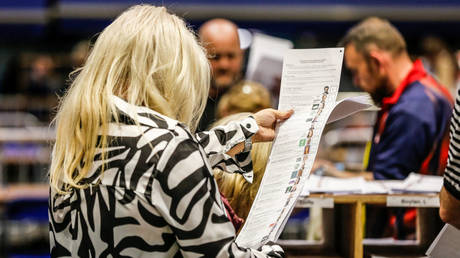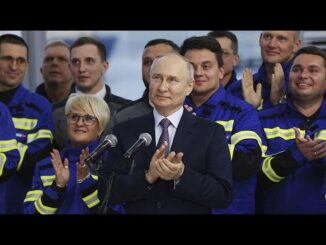
MEPs don’t call the shots, so any real change in the bloc will emerge from domestic upheavals
The European Parliament elections have shaken up the political space but won’t bring revolutionary changes at EU level. Despite the success of Euroskeptic forces in a number of countries, the composition of the representative body has not seriously changed. The main jobs in the bloc’s institutions will, as always, be distributed between the mainstream – the conservatives (EPP), socialists (S&D) and liberals (Renew).
The main conclusion is that in the two largest EU countries – France and Germany – the ruling forces no longer enjoy popular support. Macron decided not to delay but to try to reverse the trend immediately, by calling elections with a three-week campaign. Berlin’s right-wing opposition – the CDU/CSU – also called for new elections, but this is highly unlikely.
Macron is taking a risk, but he is counting on the fact that citizens tend to vote differently in European than in national elections. In the first case, voting is an opportunity to express dissatisfaction with the authorities without risking anything, because the daily life of a European does not depend on what deputies in Brussels and Strasbourg do.
The second is to elect those who will form the government and on whom, therefore, their pockets depend. In national elections, it’s the managerial experience of the candidates that counts, and so-called populists usually don’t have these skills. As a result, the outcome of national elections is usually more favorable to the mainstream. This was the case under normal and stable conditions, but now we can only dream of those.
Macron put the Ukrainian issue at the center of his campaign for the European Parliament (to the point of promising direct intervention in the fighting). This didn’t mobilize voters. In Germany, the subject also played an important role, although it wasn’t central. The CDU, which was very successful, is even more pro-Ukrainian than the Social Democrats. However, the success of the Alternative for Germany and Sarah Wagenknecht’s new party shows that this line also has its opponents – both forces oppose arming Ukraine.
Will this demonstration of skepticism by a significant part of the electorate towards involvement in the Ukrainian conflict affect the policies of the EU and its individual members? We dare say that it will not. Firstly, the modern European establishment (we are talking about large countries, in smaller countries the situation is more flexible) perceives the signals of the electorate in a peculiar way. Not in the sense that it is necessary to change course, but in the sense that (a) they have not done enough to explain the necessity of such a policy and that, (b), they have not prevented hostile (Russian) influence. So, it is not necessary to change direction, but to continue on the same course, but with redoubled efforts.
There is, however, one important nuance. Both in France and (especially) in Germany, the so-called far-right parties are still virtually isolated; they cannot participate in normal coalition politics. The common accusation is that they play the role of Putin’s ‘fifth column.’ However, the degree of their support is already such that it will not be possible to marginalize these forces indefinitely. In Germany, as commenters note, the issue will soon become a question – it is time either to ban the AfD party as “extremist” or to start treating it as an ordinary political force. So far, they are leaning towards the former, but no decision has been made. “Normalization” of these parties, as the example of Giorgia Meloni in Italy shows, may move them towards a mainstream agenda. But such an outcome is not guaranteed, it depends on a critical mass.
There is really no alternative to Western Europe’s current foreign-policy course – too much credibility has been placed on it. And the senior comrade across the ocean also backs the current course. So, they must persevere. Fluctuations are possible, but they are linked (as in the US if Trump becomes president) not to a revision of the fundamentals but to the paralysis of the system in the event of a breakthrough to real power by non-systemic forces. If, for example, Le Pen’s National Movement wins the French elections and takes over government, the ‘cohabitation’ will turn into a series of squabbles at the highest managerial level. It would be difficult to take any decisions. In other words, the alternative to current politics is not a different politics, but rather the dysfunction of any politics.
Western European politics is changing in structure, but not yet in substance. Most likely, it can only change as a result of breakdowns and upheavals that can be expected but cannot be predicted.
This article was first published by Profile.ru, translated and edited by the RT team
Take the Survey at https://survey.energynewsbeat.com/






